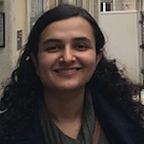My grandmother may not be the sharpest knife in the drawer when it comes to facts or street smarts. She struggles with the simplest of English terms, often reverting to exuberant hand gestures to communicate. She once attempted to walk to a field five minutes away from our home, and ended up at a Stop & Shop twenty minutes away in the opposite direction. After a half-hour of fruitless searching, she arrived at our house in the backseat of a police car, teary-eyed but fortunately not handcuffed. While she may not have the best sense of direction, she has been able to educate me on Indian customs, giving me a higher appreciation for my culture and a yearning to learn more.
If there is anybody who has helped me discover more about myself, it is my grandmother- or as I call her, Nani. When I was younger, I was fluent in both Hindi and English. Once I reached the age of five, my capacity to communicate in Hindi vanished. What could have made me to forget how to speak an entire language? The answer is simple- Nani’s absence. She used to visit us frequently, leaving her one-bedroom apartment in India that my mother and her two siblings had grown up in to come and spend time with us. While she did not enjoy the chilly winds of New York winters, tugging on scarves and leaving a stinging sensation on exposed skin, she was always pleased to spend time with me and teach me the basics of our native language. Once I began elementary school I only spoke English, and Nani’s teachings began to drain out of my mind. She did not visit for the next few years, and the lack of her presence has resulted in a near complete loss of my ability to speak Hindi. I can still pick up certain phrases, such as aap kaise hain (how are you?) and chup karo (be quiet!), but I am far from fluent.
Four years ago, when my grandfather, Nana, passed away, Nani began traveling to the United States more often. As I spent more time with her, I began to learn about my culture again and discovered a hidden appreciation for it. Drinking masala chai in the afternoon while playing cards is a staple for her, and I soon became accustomed to this routine. Whenever we are together, I make sure to set aside time to drink chai and play a game of “Grand Slam” or “Gin Rummy,” a couple of her favorites. During this time, Nani recounts stories from when she was younger while my mother translates the sections I am unable to comprehend. I listen intently to intriguing tales about Nani: stories involving scaling mango trees to retrieve the succulent fruit and celebrating holidays such as Holi, the festival of colors, or Diwali, the festival of lights.
My mother’s own anecdotes about these events are engaging, but not quite as compelling as Nani’s accounts. The eloquent details about the local children dressed in old clothes and tossing colored powder at one another during Holi invoke vivid images in my mind.The aspects of Diwali she describes, from the the gathering of communities to the bright lights and sparklers, never fail to fascinate me. While my mother makes sure we celebrate Diwali every year in our household by decorating diyas (clay candles) and dipping silver coins into milk, the descriptions from my grandmother manage to ignite a bright spark in these customs.
I have only visited India twice, and both times Nani has introduced me to many unique aspects of the country. There are spice-laden dishes, doorless auto rickshaws, and persistent vendors chasing potential customers down crowded streets. What I find the most interesting, however, is the sense of trust. I remember an incident where my mother was short a few rupees at a convenience store, and the owner allowed her to take the items and bring the money in the next day. This incident made me realize that the honesty residing in my culture was something to take pride in.
Nani has helped me uncover an interest in the customs of my family. She has taught me about the bond between communities in India and how even those without a home can join in on festivities. Her accounts of this rich culture have not just educated me on Indian traditions; they have taught me about the significance of togetherness. My appreciation for integrity came from her. My appreciation for culture came from her. My appreciation for family came from her. By learning about her past, I have discovered more about my own values. Without her influence, without her presence in my life, I would never have discovered these things. I hope to discover more: I want to learn Hindi again, visit India more often to explore the culture, and improve my card game skills.
